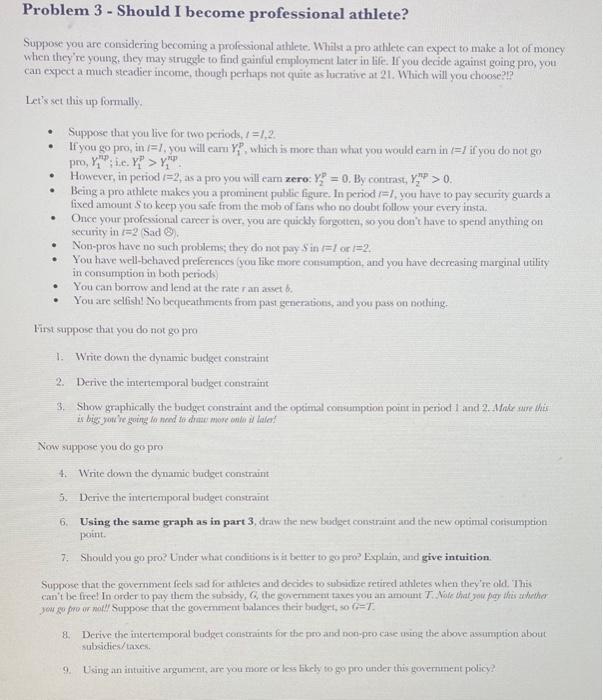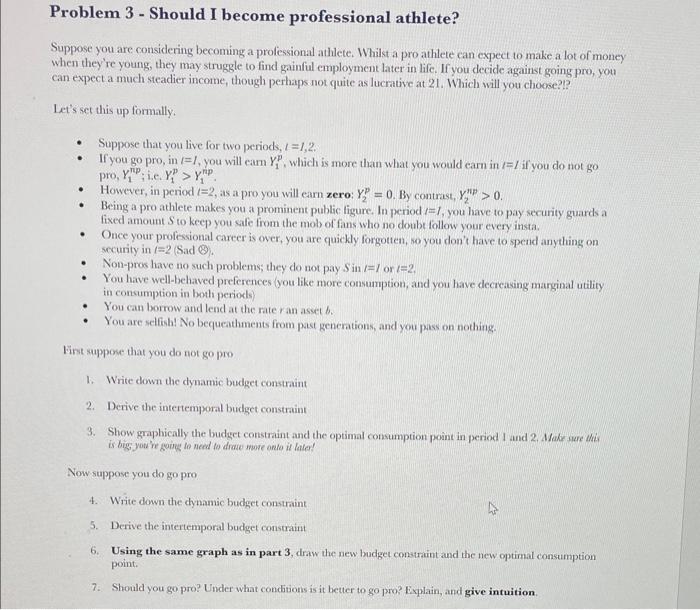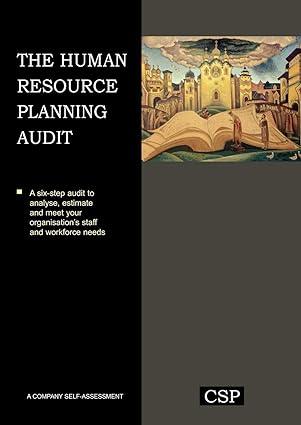Economics-
it won't let me change it

Suppose you are considering becoming a professional athlete. Whilst a pro athlete can expect to make a lot of money when they're young, they may struggle to find gainful employment later in life. If you decide against going pro, you can expect a much steadier income, though perhaps not quite as lucrative at 21 . Which will you choose?? Let's set this up formally. - Suppose that you live for two periods, l=1,2, - If you go pro, in =1, you will eam Y1p, which is more than what you would carn in f=l if you do not go pro, Y1Ipp; i.e. Y1p>Y1rip. - However, in period t=2, as a pro you will earn zero: Y2p=0. By contrast, Y2np>0. - Being a pro athlete makes you a prominent public ligure, In period t=1, you have to pay security guards a lixed amount S to keep you safe from the mob of fans who no doube follow your every insta. - Once your profiessional career is over, you are quickly forgotten, no you don't have to pend anything on security in =2( Sad (8) ). - Non-pros have no such problems; they do not pay S in l=l or t=2. - You have well-behaved preferences (you like more consumption, and you have decreaking marginal utility in consumption in botli periocls) - You can borrow and lend at the rate ran asset b. - You are selfish! No bequeathments from past generations, and you pass on nothing. First suppose that you do not go pro 1. Write down the dynamic bedget constraint 2. Derive the intertemporal budget constraint 3. Show graphically the budget constraint and the optimal consumption point in period I and 2, ./ake sue thit is big you're going to need to drawe more anto it later? Now suppose you do go pro 4. Write down the dynamic budget constraint 5. Derive the intertemporal budget constraint 6. Using the same graph as in part 3, draw the new budget constraint and the new optimal consumption point. 7. Should you go pro? Under what concitions is it better to go pro? Explain, and give intuition. Problem 3 - Should I become professional athlete? Suppose you are considering becoming a profexional athlete. Whils a pro arhlete can expect to make a lot of moncy when they're younge they may struggle to find gounful employment later in life. If you decide against going pro, you can expect a much steadier income, though perhaps not quite as hucrative at 21 . Which will you choose?t? Let'siset this up formally. - Suppose that you live for two periods, l=1,2. - If you go pro, in t=1, you will caru Y1p, which is more than whet you would earn in =1 if you do not go pro, Y1mp; i.e. Y1p>Y1np. - However, in period t=2, as a pro you wall earn zero: Y2p=0. By contrast, Y2MP>0. - Being a pro athlete makes you a prominent public figure. In period r=1, you have to pay security guards a fixed amount S to keep you safe from the mob of fans who no doubt follow your every insta. - Once your professional career is over. you are quickly forgotten, soyou don't have to spend anything on sccurity in r=2 ( Sad 8). - Non-pros have no such problems; they do not pory S in IF 1 or i=2. - You have well-behived preferences you like more cothumption, and you have decreasing marginal utility in consumption in both periodk) - You can borrow and lend at the rate r an aseet b. - You atre selfish! No bequeathments from past generations, and you pass on nothing. Fint suppose that you do not go pro 1. Write downn the dymamic budget constraint 2. Derive the intettemporal budget constraint Now auppose you do go pro 4. Write downt the dymamio budget constraint 5. Derive the intertemporal budget consuaint 6. Using the same graph as in part 3, draw the new budget consuraint and the new optimal cotictumption paint. 7. Should you go pro? Under what conditions iv it better to go pro? Eiplin, and give intuition. Suppose that the government feels ad fot athleies and decides to subridize retired athletes when they're old. This your go pro of milf Suppose that the gox rmment balances their badget, so f=T. 8. Derive the intertemporal budget constaints for the pro and non-pro cave using the above assumption about sulydidies/taxes. 9. Leing an intuitive argument, are you more of less Ekely to go pro under this governtuent policy









